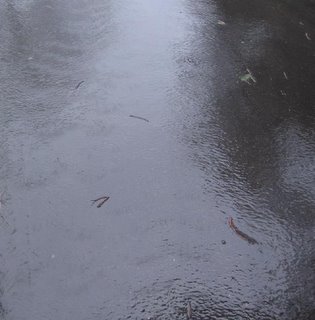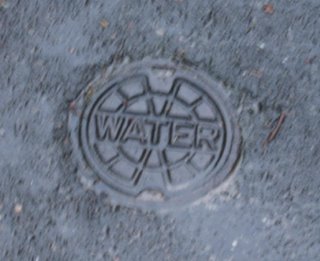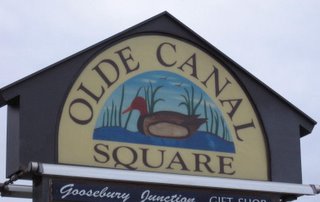Tine and Rubob ventured out into the mist on their afternoon walk again today.
"It's neither fish nor fowl with all the fog," Rubob said -- "more foul than fish."
"It's like yesterday," Tine said, heading down the street toward Diamond Glen.

"What did you think about our walk by the canal, Rubob?" Tine asked. "If you'd written it all down, what would you have said?"
"I think I would have written about its being a walk back into the past, Tine. It's easy to imagine the past when the present is misted over."
Today, the present was visible in places, on the edge of the woods. The stone walls had been washed clean by the heavy rain the night before.

"The mist was like a magical cloak that smothers the present and lets you see into the past," Rubob said. "It was such a surprise stepping off the 20th-century tarmac of the main thoroughfare and seeing the canal, wasn't it, Tine?"

"Yes, it was, Rubob."
"One could almost imagine the horses straining to pull the boats, sweating on the towpath," Rubob continued, as he and Tine turned left and made their way up Diamond Glen's steep, winding hill. "It must have been a surprise for the people riding on the canal boats to arrive at the river and suddenly see the aqueduct, one waterway leading over another, 35 feet above the river. Their surprise must have been like ours yesterday when we came upon the canal."

"It's odd, an aqueduct over a river, like you said yesterday, Rubob," Tine said. "There was all that water underneath them as they floated along in the canal's aqueduct."
Tine stopped to look at the brook rushing down the hill beside the road.

"Now there's a sign of industry, too," Rubob said -- "the stream issuing forth from the old mill pond at the top of the hill." The brook had powered a sawmill as long ago as 1650. Now the pond was overgrown, hidden in the mist.
"And then when we walked down the towpath to the river, Tine," Rubob said, "it kept going back and back and back. It was like stepping into one of those gardens behind the houses on Main Street, the ones that seem to never end. From the sign by the road, marking the canal, who would have guessed? It was so unexpected, like on the garden tours. "
"It was, Rubob," Tine said. "It was exactly as you've described it. And yet the funny thing is that I focused on other things, other themes, when thinking about it last night. But what you said, it was just like that."
The mist was moving through the woods at the top of the hill, veiling them in places, making other areas stand out in sharp relief.
"Protean," Rubob said. "Everything is transformed by the mist."
"Proteus -- that's the epidsode in 'Ulysses' with Stephen Dedalus on the beach," he said. "Proteus is the god who can change his shape to avoid being captured. When he is captured, he can foretell the future. In 'Ulysses,' 'Proteus' is an episode about Stephen's consciousness -- the Protean, shifting nature of his mind and experience -- of his world, of matter and time. "
As Rubob and Tine made their way along Reservoir Road, the mist was beginning to change to drizzle, and Tine unzipped the hood in the collar of her jacket. She walked along quickly, taking in everything Rubob was saying.
They passed a wheel that reminded Tine of the buggy wheel on the sign at Henny Penny's garage:

"I've been reading Frank Budgen's 'The Making of Ulysses' again,' " Rubob said. You know how I pick it up from time to time."
"Gudgeon, Rubob? Who's he?"
"Budgen. He was a painter who met Joyce in Zurich after World War I. He was one of Joyce's greatest friends. They first met over dinner at the home of a mutual friend. Budgen describes seeing a man who was almost storklike coming up the path to the house -- tall, thin, carrying a cane, wearing thick glasses."
"He must have seen a world shrouded in mist all the time, Rubob," Tine said -- "Protean."
"Townsend, of course, talked about Budgen a lot," Rubob said, referring to an old friend of his who taught English literature. I think he used the book in his courses."
"Budgen and Joyce met almost every day to talk. And one day Joyce sent him the first six chapters of his book, 'Ulysses.' Think of that, Tine. Budgen may have understood Joyce better than anyone. But of course you can't ever know what someone’s thinking. Someone else's mind is like a closed façade of a building, one you can't see behind."
Tine was huddled under her hood, hurrying along, trying not to get wet. Rubob might have wondered what was going on in that head of hers, but she was absorbing every word of his, while her coat and shoes were absorbing the drizzle. Tine's view on today's walk was somewhat constricted, but she enjoyed listening to Rubob. She focused her vision on the streams of water on the tarmac, as Rubob called it.

"Joyce once asked Budgen who he thought was the greatest figure in literature," Rubob said. "Budgen thought about it for a while and said maybe it was Hamlet. 'He's just a son,' Joyce said. 'Faust,' Budgen proposed next. 'We know nothing about him, not even what he looked like,' Joyce said. 'Of course it's Ulysses,' Budgen realized Joyce was getting at. Ulysses was the greatest of all literary characters -- Ulysses the warrior, the wanderer."
The mist lifted a little as the drizzle became heavier, turning to rain. Houses stood out more clearly.

The topic of conversation then shifted unaccountably to the news that Rubob had been following with such interest, the Senate hearings on the nominee for the Supreme Court.
"Townsend's son was a clerk for Justice Blackmun, interestingly enough," Rubob said. "He even did research on Roe v. Wade. Imagine that."
Tine, listening, continued to keep her eyes down on the path ahead:

"One can't really predict how a Justice is going to rule. He might just chip away at Roe v. Wade. But who knows what the the cases coming up before him will be? There's established precedent, of course, but the law is always shifting, along with people's perceptions, their points of view. "
The conversation then veered back to "Ulysses" again:
"Dedalus, of course, has the freest of imaginations. He's not tied down by any conventions or convictions, by institutions such as the church. We see the workings of his mind in Joyce's stream-of-consciousness writing," Rubob said. "Joyce gets more and more comfortable with the novel as he gets farther into it, and he takes more liberties with the theme of consciousness -- and as he does, the novel becomes increasingly difficult to understand."
"Of course, Dedalus is constricted in some ways, too, precisely because of the freedom of his thoughts," Rubob continued. "He's asked to pray for his mother when she's dying, and of course he won't."
Tine stopped to look at a building next to the library that was being remodeled:

"It's hard to make out under the scaffolding," Rubob said. "We won't really know what it's going to look like until it's done, will we Tine?"
"A work in progress, Rubob," she said. "Only six chapters so far. "
The fog was thickening as Rubob and Tine turned onto their own street.

"Look, Rubob, the walker stands out most of all in the mist." There's something about a mist that throws walking into sharp relief," she thought.
"The wanderer," she said to Rubob.
As she made her way home, shielding herself from the mizzle, Tine continued to focus most her attention on the tarmac, but she drew on a wellspring of thoughts -- hers and Rubob's.

"All in all," she thought arriving home, "it was a very pleasant walk."



















